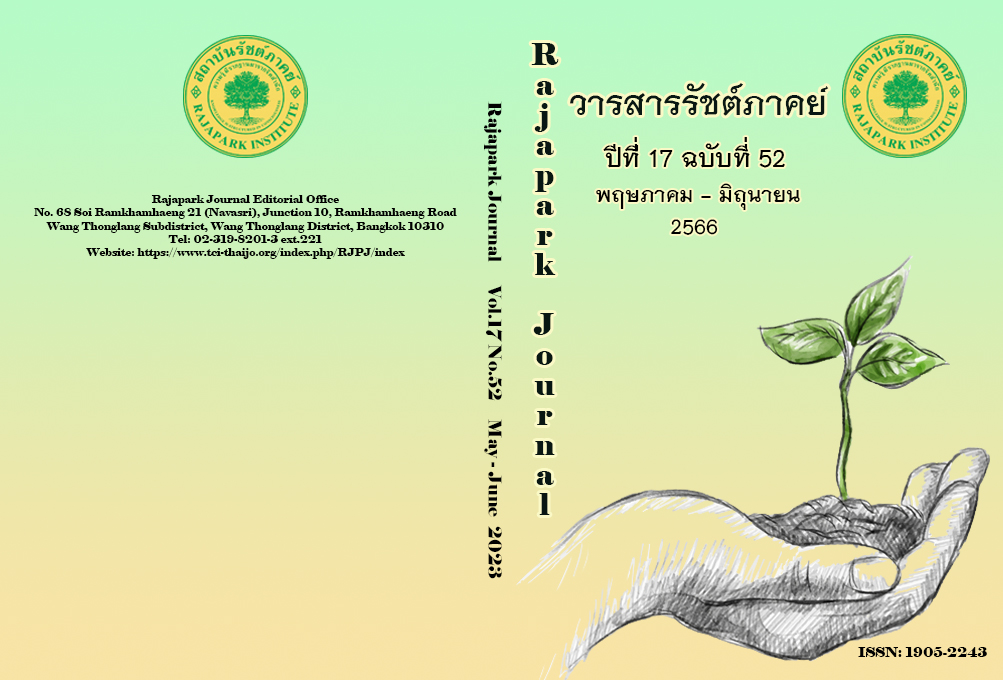Academic Leadership of School Administrators Affecting Quality of Learners in the New Normal Era Under Nakhon Phanom Primary Educational Service Office Area 2
Main Article Content
Abstract
This study focused on finding the effects of academic leadership of school administrators towards the quality of learners in the new normal era from related stakeholders in Nakhon Phanom Primary Education Office, Area 2 with the following purposes: 1) to study and compare academic leadership of the school administrators, 2) to study and compare the quality of the learners classified in the new normal era, 3) to study the correlation between academic leadership of the school administrators and quality of learners in the new normal era, and 4) to study the predictive power of academic leadership of school administrators affecting the quality of learners in the new normal era. Questionnaires were used as the research tools. The sample was 382 administrators and teachers in the area mentioned. The results were as follows:1) the overall academic leadership of the administrators in the area was at the highest level, while comparing academic leadership of the administrators classified by their status, the results were statistically different, 2) the overall quality of learners in the new normal was at the highest level, while comparing students’ quality classified by status and size showed statistically differences, 3) The correlation between academic leadership of administrators and the quality of learners in the new normal era was statistically positive (rxy= .88). 4). Variables to yield academic leadership of school administrators include technology, research and innovation, learning environment, and modern vision of school administrators which have predictive power to affect quality of learners in the new era at 29%.
Article Details

This work is licensed under a Creative Commons Attribution-NonCommercial-NoDerivatives 4.0 International License.
Views and opinions appearing in the Journal it is the responsibility of the author of the article, and does not constitute the view and responsibility of the editorial team.
References
Bunchai, C., & Kheawnamchum, J. (2021). Academic Leadership of School Administrators Affecting Student Quality in Thailand of 4.0 Era, Under the Bueng Kan Primary Educational Service Area Office. Rajapark Journal, 15(38), 208-223.
Chanthorn, R., & Jinarat, P. (2019). The Strategic Development and Learning Organization to Support Students Quality in Sports School Under the Institute of Physical Education. UMT Poly Journal, 16(1), 481-487.
Chaotrakul, K. (2019). Developing the quality of learners through the cooperation of public and private organizations Nawaminthrachinuthit Triamudomsuksanomklao School[Research Report, Office of the Basic Education Commission, Ministry of Education].
Chareonkorn, S. (2018). Academic Leadership of Educational Institution Administrators in the Organization. Journal of Roi Kaensarn Academi, 3(2), 1-16.
Inwang, K., Peechapol, C., Jindamanee, T., & Somboonpol, U. (2017). An Academic Leadership Developmental Model by Knowledge Management of Executives from Private Universities. Journal of Business Administration, 6(1), 114-129.
Juntha, C. (2020). A Study of Academic Leadership of School Administrators under Office of Basic Education in Nakhon Phanom Province[Master’s Thesis, Sakon Nakhon Rajabhat University].
Karnjanapun, R. (2020). School administration in the crisis situation of the Coronavirus 2019 (COVID-19). Ph.D. in Social Sciences Journal, 10(3), 545-556.
Klanpaitoon, S. (2021). A Model for Developing Administrator’s Instructional Leadership in The Digital Age[Master’s Thesis, University Naresuan].
Kopatta, S., Poovatanakul, V., Wattananarong, A., & Meekhun, K. (2021). Learner Quality Students Support System Administration in Schools. Journal of Roi Kaensarn Academi, 6(8), 371-387.
Limpaiboon, T. Wonnawedand, N., & Pauwongsaku, S. (2022). (2019). The Academic Leadership in the 21st Century of Basic EducationalSchool Administrators Under the Secondary EducationalService Area Office Suphanburi. Journal of Roi Kaensarn Academi, 7(1), 36-48.
Ministry of Education. (2020). Formulating Educational Standards for Educational Institutions. The Agricultural Co-operative Federation of Thailand Printing Press, Ltd.
Office of the Basic Education Commission. (2018). Basic Educational Standards and Internal Quality Assurance of Educational Institutions. The Agricultural Co-operative Federation of Thailand Printing Press, Ltd.
Pakdeesri, N., Phothiwat, S., & Kittiporn, L. (2017). Factors Academic Administration of Administrators Affecting the Quality of the Students in Schools Under the Office of Sakon Nakhon Primary Educational Service Area 1. Journal of Educational Administration and Leadership, 6(21), 93-103.
Pomkasate, P., Xupravati, P., & Siribanpitak, P. (2020). Student Supporting Systems Management Analysis for Enhance the Quality of Secondary School Students. Journal of Education Studies, 49(4), 1-13.
Sirisawad, W., & Sriputtarin, S. (2020). Implementation of Student Supporting System and Student Quality Under the Secondary Educational Service Area Office 22 in Nakhon Phanom Province. Rajapark Journal, 14(34), 153-167.
Somprach, K. (2017). Learning Leadership of School Principals: A Grounded Theory Study. Social Sciences Research and Academic Journal, 12(34), 51-66.
Srisa-ard, B. (2017). Preliminary Research (10th ed.) Suweeriyasan.
Tancharernrat, T. (2020). Instructional Leadership of Administrator and Teacher Skill in 21st Century in School Under the Secondary Educational Service Area Office 8[Master’s Thesis, Silpakorn University].
Tigulwong, S. (2021). The Development of a Strategic Plan for Managing a Student-Centered Learning Process to Strengthen the Quality of Students According to Basic Educational Standards for the Students of Rittiyawannalai School Under Secondary Educational Service Area Office 2. Interdisciplinary Sripatum Chonburi Journal, 7(1), 57-69.


